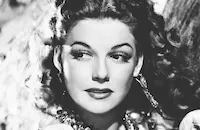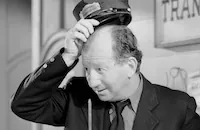Shine on Harvest Moon

Brief Synopsis
Cast & Crew
David Butler
Ann Sheridan
Dennis Morgan
Jack Carson
Irene Manning
S. Z. Sakall
Film Details
Technical Specs

Synopsis
In 1905, songwriter and performer Jack Norworth is taken by his magician friend, the Great Georgetti, to see a singer named Nora Bayes, who is performing at a local honky-tonk cabaret run by Dan Costello. In between numbers, Costello encourages Nora to entertain the cabaret's owner, Tim Donovan. Jack is so impressed with Nora's rendition of one of his songs that he offers to help her break into vaudeville. When Costello interrupts their conversation to insist that Nora return to Donovan's table, a fight ensues, and Jack, Georgetti and Nora are thrown out of the cabaret. Jack walks Nora home and promises to get her a tryout at the Crystal Theater where he works. Later, Costello offers to rehire Nora and also proposes marriage, but Nora angrily sends him away. In retaliation, Costello hires a group of ruffians to disrupt Nora's audition. Jack then suggests that Nora and another singer, Blanche Mallory, perform as a sister act at a theater run by his friend, Poppa Karl. Later, believing that Jack favors Nora over her, Blanche quits the act. Jack then marries Nora, and they become a team. They travel around the country singing Jack's songs and are a big success. Later they return to New York, hoping to sign a contract to perform there, but Costello and Donovan have bought up the largest chain of theaters and refuse to book them. Costello then proceeds to pressure other theater owners into blacklisting the couple, and Jack and Nora fall on hard times. Jack writes "Shine On, Harvest Moon," which he is sure will be a hit. His publisher agrees, but wants Blanche, who is now working for Costello, to introduce the song. Blanche will agree only if Jack teams up with her, and when he declines, she refuses to sing the song. One night, Georgetti and his assistant, Margie, visit Jack and Nora, and Margie accidentally discloses Blanche's offer. Not wanting to stand in the way of Jack's success, Nora tells Blanche that she is leaving Jack. Later, Poppa Karl finds Nora working in an Atlantic City music store and tells her that Jack is so depressed by her leaving that he has been fired from every job he has taken. Happily, Nora returns to New York for Jack's opening in burlesque. When Jack sees Nora, he begins to sing to her, and she joins him in a duet. They are seen by a man who works for showman Florenz Ziegfeld, who puts them in the revue. Together they sing "Shine On, Harvest Moon" and are a huge success.

Director
David Butler
Cast

Ann Sheridan

Dennis Morgan

Jack Carson

Irene Manning

S. Z. Sakall

Marie Wilson

Robert Shayne
Bob Murphy
The Four Step Brothers
The Ashburns
Will Stanton

Paul Panzer
Al Hill
Tom Herbert

William Davidson
Fred Kelsey

Joseph Crehan
Charles Jordan
Don Barclay
Dorothy Grainger
Doodles Weaver
Charles Wilson
James Bush

Nestor Paiva
Ann Codee

Marjorie Hoshelle
Philip Van Zandt
Edward Hearn
Paul Stanton
John Peters

Brandon Hurst
Otto Shafter
Phyllis Kennedy
Harry Seymour

Mike Mazurki
Frank Hagney
Jack Norton
Bert Roach
Dutch Hendrian
Ed O'neill
Art Miles
Michael Gaddis
Charles Marsh
Tom Quinn
Jack Boyle
Duke Johnson
Billy Bletcher
Peggy Carson
Nita Pike
Doria Caron
Dick Humphreys
Marilyn Kay
Ethel Shattuck
Edward Ward
Johnnie Berkes
Billy Young
Betty Bryson
Jack Daley
Mike Donovan
Frank Mccarroll
Charles Mcavoy
Kernan Cripps
Tom Murray
George Mcdonald
Bob Reeves
Bill O'leary
Charles Mcmurphy
Allen D. Sewall

Hank Mann
George Bunny
Sam Adams
Paddy O'flynn
Francis Sayles
Henry Sylvester
Nolan Leary
Cy Ring
Crew
Milo Anderson
Nora Bayes
Vincent P. Bryan
Dudley Chambers
Hugh Cummings
Henry Dacre
Edwin A. Dupar
Arthur Edeson
Gus Edwards
Julian Edwards
Leo F. Forbstein
David Forrest
Cliff Friend
Kim Gannon
Harry Gifford
Haven Gillespie
Otto Harbach
Sam Hellman
Jesse Hibbs
Karl Hoschna
Tony Jackson
William Jacobs
M. K. Jerome
Gus Kahn
James Kern
James Leicester
Henry I. Marshall
Lynn Martin
Frank Mattison
Jack Mcconaghy
Tom Mellor
Irene Morra
Stanley Murphy
Jack Norworth
Charles Novi
Frank Perkins
Leroy Prinz
H. Roemheld
Seymour Simons
Stanislaus Stange
Francis Swann
Dolph Thomas
Charlie Tobias
Huntley Trevor
Egbert Van Alstyne
Albert Von Tilzer
Jack L. Warner
Richard Weil
Richard Weil
Perc Westmore
Richard A. Whiting
Harry Williams

Film Details
Technical Specs

Articles
Shine On, Harvest Moon
What Shine On, Harvest Moon lacked in veracity, however, it made up in entertainment value. The musical numbers were plentiful and well performed. Like Nora Bayes herself, Ann Sheridan had an appealing contralto singing voice. But she wasn't allowed to use it in Shine On, Harvest Moon - her vocals were dubbed by Lynn Martin. Still, David Butler recalled that Sheridan's lip synching was "perfection," and that Lynn Martin's voice matched Sheridan's quite well. Dennis Morgan, an experienced musical performer, did his own singing, even though his tenor voice was nothing like Jack Norworth's. Irene Manning, playing a rival of Sheridan's, also contributed some good musical numbers, and Jack Carson and Marie Wilson were standouts in a comedy routine, "So Dumb but So Beautiful." The production cried out for technicolor, but because of wartime restrictions, the film was shot in black and white, with only the finale - the title number - shot in color. Because of the profusion of greenery in the number, critics had fun mocking it, with comments like "Warner Brothers must have traded in the script for a seed catalog."
Co-star Jack Carson was familiar with the era portrayed in the film. Early in his career, Carson was half of a vaudeville team which satirized the music of that period. A talented comedy and musical performer, Carson also proved himself in dramatic roles in such films as Mildred Pierce (1945) and A Star Is Born (1954). He and Dennis Morgan would make several "buddy" pictures together, including Two Guys from Milwaukee (1946), and Two Guys from Texas (1948).
The reviews for Shine On, Harvest Moon were decidedly mixed at best. Variety's was typical, praising the musical numbers, and noting that director David Butler "gets plenty out of the cast members, despite script deficiencies." Unfortunately for the cast, many critics still remembered the real Norworth and Bayes fondly (Norworth, in fact, was still alive when the film was released, and still performed occasionally). Bosley Crowther's New York Times review was, alas, also typical: "As for the performances of Miss Sheridan and Mr. Morgan in the pseudo-biographical roles, we can only say that history does not repeat itself." But finally, enough time has now gone by that the performances in Shine On, Harvest Moon can be appreciated on their own, without any comparisons to the long-gone originals.
Producer: William Jacobs
Director: David Butler
Screenplay: Sam Hellman, Richard Weil, Francis Swann, James V. Kern, based on the story by Richard Weil
Art Direction: Charles Novi
Cinematography: Arthur Edeson
Costume Designer: Milo Anderson
Editor: Irene Morra
Music: Leo F. Forbstein, Music Director; Songs by Jack Norworth, Nora Bayes, and others
Cast: Ann Sheridan (Nora Bayes), Dennis Morgan (Jack Norworth), Jack Carson (The Great Georgetti), Irene Manning (Blanche Mallory), S.Z. Sakall (Poppa Karl), Marie Wilson (Margie), Robert Shayne (Dan Costello), Bob Murphy (Police Sergeant).
BW & C-113m. Closed Captioning.
by Margarita Landazuri

Shine On, Harvest Moon
Quotes
Trivia
Notes
Nora Bayes, whose real name was Eleanor Goldberg, a popular entertainer and songwriter in vaudeville and on Broadway, was known for her deep voice and dynamic style. She was the first person to sing George M. Cohan's 1917 song "Over There." Among the shows she appeared in were the Ziegfeld Follies of 1907, 1908, and 1909; Little Miss Fix-It (1911); Maid in America (1915); The Cohan Revue (1917); and Queen O'Hearts (1922). Bayes was married five times. Her second husband was Jack Norworth, with whom she formed a stage act. In a New York Herald Tribune article, Norworth remembers that he first met Bayes when she came into his publisher's office looking for new material. They were married two weeks later and began to perform as a team in vaudeville. Later, they performed for two seasons in the Ziegfeld Follies before their marriage ended. Bayes died in 1928.
According to press releases in the file on the film at the AMPAS Library, Harold Goldman and Bert Granet were at one time assigned to write the screenplay and Julius J. and Philip G. Epstein were to make their producing debut with this film. Hollywood Reporter news items add that Jerry Wald was also slated to produce the film, some scenes for which were shot on location at the Warner Bros. Ranch.















